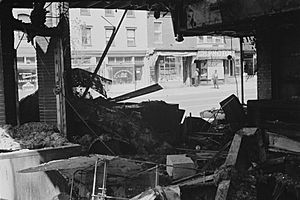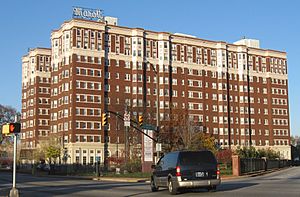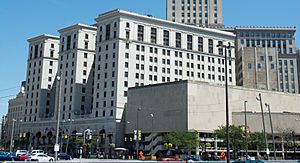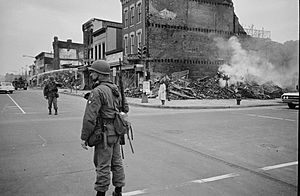On the Mindless Menace of Violence facts for kids
On the Mindless Menace of Violence is a famous speech given by Robert F. Kennedy, who was a U.S. Senator and was running to become president. He gave this speech in Cleveland, Ohio, on April 5, 1968. This was just one day after Martin Luther King Jr. was assassinated.
Kennedy wanted to calm down the riots and disorder that were happening in many cities. He also wanted to talk about the growing problem of violence in America.
On April 4, 1968, Martin Luther King Jr., a very important leader in the African-American civil rights movement, was killed. After this, riots broke out in cities across the United States. Kennedy had just given a quick speech about it in Indianapolis. Then, he decided to pause his presidential campaign.
However, community leaders convinced him to still give one speech in Cleveland. Kennedy and his speechwriters worked through the night to write a new speech about King's assassination. Kennedy reviewed and changed the speech on his way to Cleveland. He spoke for only ten minutes to about 2,200 people. He shared his thoughts on violence in American society. He criticized both the people rioting and the white leaders who he felt were responsible for the bad social conditions. He didn't offer exact solutions but asked everyone to find common ground and work together.
Kennedy's speech in Cleveland didn't get as much attention as his speech in Indianapolis. Many news outlets and experts largely forgot about it. However, some of his helpers thought it was one of his best speeches ever. Journalist Jack Newfield even said it was a fitting tribute to Kennedy, who was assassinated two months later.
Contents
The Story Behind the Speech
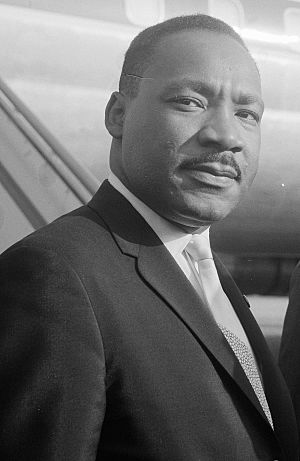
On April 4, 1968, Martin Luther King Jr. was killed in Memphis, Tennessee. Senator Robert F. Kennedy was traveling to Indianapolis for his presidential campaign when he heard the sad news. He gave a short, unplanned speech there. Then, he stopped all his campaign activities and went to his hotel room.
After talking on the phone with several African-American community leaders, Kennedy decided to speak out against the violence that followed King's death. He also decided to keep his planned speech in Cleveland. His helpers agreed this was a good idea. They also thought he should go to Washington, D.C., and stay there until King's funeral.
Kennedy also spoke with Coretta Scott King, King's wife. She asked him to arrange a plane to bring King's body home. Kennedy's team helped the King family with many phone calls.
That night, Kennedy met with 14 local Black leaders at his hotel. The conversation became heated, as some leaders accused him of being part of "the white establishment." Kennedy got upset, saying he didn't need the trouble and was trying to help. He told them they were complaining about personal problems instead of talking about their own people. The meeting ended with most leaders supporting Kennedy's campaign. One leader later said Kennedy was "completely sympathetic and understanding."
Kennedy later wondered if King's murder reminded him of his brother, John F. Kennedy's, assassination in 1963. He said, "Well, that. But it makes me wonder what they might do to me too." He also told his speechwriter, "You know, the death of Martin Luther King isn't the worse thing that ever happened in the world." The speechwriter later understood that Kennedy was thinking about his brother's death.
Meanwhile, Kennedy's speechwriters, Jeff Greenfield and Adam Walinsky, worked on a formal speech about King's assassination. They got help over the phone from Ted Sorensen. Walinsky wrote most of the speech.
Around 2:30 AM on April 5, Kennedy found his speechwriters asleep. He covered Greenfield with a blanket. Greenfield woke up and said, "You aren't so ruthless after all." Kennedy replied, "Don't tell anyone." Later that morning, they finished the speech.
Before flying to Cleveland, Kennedy had an interview with entertainer Jack Paar. Kennedy was very serious. When asked if jobs would solve problems in poor city areas, Kennedy said jobs were important, but people also needed "compassion for one's fellow human beings." When Paar asked about King's assassination, Kennedy said, "That more and more people are turning to violence. And in the last analysis it's going to destroy our country."
During the flight to Cleveland, Kennedy reviewed and changed his speech a lot. His plane arrived 90 minutes late. A planned parade from the airport was canceled out of respect for King. Kennedy rode into the city in an open car. An aide warned him that police thought a sniper might be hiding near the hotel where he was speaking. Kennedy refused to stop, saying, "No. We'll never stop for that kind of threat." Kennedy passed a crowd of about 10,000 people gathered for a memorial service for King. He had been scheduled to speak there but canceled that event.
Kennedy's Powerful Speech
Many people wanted to hear Kennedy speak. The City Club had sold over 1,400 tickets for the event. Local TV channels interrupted their regular shows to broadcast Kennedy's speech live. He spoke quietly and seriously for only 10 minutes to about 2,200 people, mostly wealthy and white members of the City Club of Cleveland.
What Kennedy Said
Kennedy began by saying his own political goals didn't matter right now. He focused on the serious situation, saying:
This is a time of shame and sorrow. It is not a day for politics. I have saved this one opportunity to speak briefly to you about this mindless menace of violence in America which again stains our land and every one of our lives.
This statement set the serious mood for his speech. Kennedy then talked about "violence" using strong, emotional words. He said violence affected all Americans, no matter their race. He spoke about King's death and how pointless violence is, asking:
Why? What has violence ever accomplished? What has it ever created? No martyr's cause has ever been stilled by his assassin's bullet. No wrongs have ever been righted by riots and civil disorders. A sniper is only a coward, not a hero, and an uncontrolled, uncontrollable mob is only the voice of madness, not the voice of the people.
With these words, Kennedy was telling people not to riot after King's death. He was comparing their actions to those of King's killer. After quoting Abraham Lincoln, Kennedy said that Americans were giving in to violent tendencies. He argued that all deaths harmed American society. He believed that any and all acts of violence were wrong.
Kennedy explained how the United States was becoming too accepting of violence. He mentioned how people accepted news reports about the Vietnam War. He also talked about how often killing appeared in movies and TV shows. He also pointed out the lack of strong gun control laws. He criticized people who had different rules for foreign and domestic policy. Some supported peace abroad but not in the U.S. Others condemned riots but were responsible for the conditions that caused them.
He then talked about how some Americans "look for scapegoats, others look for conspiracies." He criticized the government and powerful groups:
For there is another kind of violence, slower but just as deadly, destructive as the shot or the bomb in the night. This is the violence of institutions; indifference and inaction and slow decay. This is the violence that afflicts the poor, that poisons relations between men because their skin has different colors. This is a slow destruction of a child by hunger, and schools without books and homes without heat in the winter.
This is the breaking of a man's spirit by denying him the chance to stand as a father and as a man among other men. And this too afflicts us all.
Even in the 1960s, these words were bold and could cause debate. Kennedy warned that when society teaches people to hate each other or that someone is "lesser," cooperation decreases, and violent conflict increases.
Kennedy didn't list specific plans to solve the problems. He believed there was no single solution to end violence. Still, he said that if nothing was done, violence in the U.S. would continue. He hoped it could be stopped if people worked together for change. As he neared the end, his words became stronger and more hopeful. He finished by referring to Lincoln's second inaugural address:
Our lives on this planet are too short, the work to be done is too great, to let this spirit flourish any longer in this land of ours. Of course we cannot banish it with a program, nor with a resolution. But we can perhaps remember, if only for a time, that those who live with us are our brothers, that they share with us the same short moment of life, that they seek, as we do, nothing but the chance to live out their lives in purpose and happiness, winning what satisfaction and fulfillment they can. Surely this bond of common fate, this bond of common goals, can begin to teach us something. Surely we can learn, at the least, to look at those around us, as our fellow men, and surely we can begin to work a little harder to bind up the wounds among us, and to become in our hearts brothers and countrymen once again.
Several women were reportedly crying when Kennedy finished. Unlike other speakers, he didn't take questions. The audience gave him a standing ovation. Cleveland's main newspaper, The Plain Dealer, praised the speech as "timeless." However, the speech received little attention from national news.
What Happened Next
After the speech, Kennedy flew to Washington, D.C. As the plane landed, passengers could see smoke from fires started during the riots. Kennedy asked the pilot to circle again to get another look. After landing, Kennedy wanted to drive into the riot area to calm the crowds. Most of his helpers were shocked by this idea. Kennedy eventually went home.
Two days later, Kennedy and his wife, Ethel, attended a church service in the riot zone. Stokely Carmichael, who was blamed for causing some of the local disorder, was also there. Kennedy, a Catholic, took communion with the other church members. After the service, he asked the minister, Walter Fauntroy, how bad the damage was. Fauntroy then walked Kennedy to the worst damaged area on 14th Street. Ethel, some helpers, and a small group of reporters and local officials followed.
More people joined the crowd as they walked. It became so large that some National Guardsmen thought it was a mob of looters. Fearing a fight, they put on their gas masks and got their bayonets ready. A police car quickly drove between the crowd and the guardsmen to prevent any trouble. Fauntroy remembered, "When [the guardsmen] saw it was Bobby Kennedy, they took off their masks and let us through. They looked awfully relieved."
That evening, Kennedy held a televised press conference. He talked about creating a program like the Peace Corps to reduce racism in white suburbs. On April 8, Kennedy and his wife went to Atlanta for Martin Luther King Jr.'s funeral, as Coretta Scott King had asked. That evening, he met with his helpers to discuss how to get the attention of middle-class white people who were tired of the civil rights movement. He wanted to ease racial tension in the country.
Kennedy returned to Indiana and gave his third and final speech inspired by King's death on April 10. He moved beyond his earlier calls for compassion and an end to violence. He told white people to accept and welcome Black people into American society. For the rest of the month, Kennedy softened his campaign speeches and focused on unity and reconciliation. He repeated the same ideas he shared in Cleveland about America's problems throughout the rest of his campaign.
Why This Speech Matters
"On the Mindless Menace of Violence" has been largely overshadowed by Kennedy's Indianapolis speech. Many experts have ignored it. However, some still believe it is historically important. Journalist Jack Newfield said it was "probably the best written text of the campaign, and perhaps of Kennedy's public career." Another journalist, David Halberstam, called it "perhaps the best speech of the campaign, perhaps the best speech of his life."
Kennedy's helper, Frank Mankiewicz, wrote that it was "perhaps the best speech Robert Kennedy made during the campaign, and certainly one of the best of his career." He also called it "the most eloquent and memorable of RFK's view of humanity and the threats to its flowering and [...] survival." Journalist Jules Witcover said the speech was a "turning point" for Kennedy's presidential campaign. It helped him find new themes for his campaign.
After Kennedy's assassination in June 1968, Representative Charles Vanik of Ohio spoke in the House of Representatives. He called the Cleveland speech the late senator's "most significant statement [...] on crime and violence." Newfield believed the speech was a fitting tribute to Kennedy himself.
In 1999, Marian Wright Edelman quoted Kennedy's speech in a speech she gave. After the 2015 San Bernardino attack, she spoke about gun violence and again quoted Kennedy's words. President Barack Obama also quoted Kennedy's remarks in a letter to American law enforcement after the 2016 shooting of Dallas police officers. Journalist Bill Moyers wrote about the speech after the Dallas shooting, saying, "Today, [Kennedy's] moving words are still so relevant."
While many books and movies talk a lot about Kennedy's Indianapolis speech, most either completely leave out his Cleveland remarks or only mention them briefly. The most well-known appearance of the speech was in the 2006 film Bobby. In the movie, parts of the speech were played at the end over real and recreated footage of Kennedy's assassination.
Robert F. Kennedy's daughter, Kerry Kennedy, later said, "I actually think that the speech that he gave in Cleveland would have always been viewed as the best speech he ever gave except for the speech he gave the day before." After the Virginia Tech shooting in 2007, historian Zachary J. Martin wrote a book about the speech in 2009. A 2015 short film called The Mindless Menace of Violence showed gun violence in different American neighborhoods with parts of the speech playing over the video. The City Club of Cleveland held an event on April 5, 2018, to celebrate the 50th anniversary of the speech.
See also
- Robert F. Kennedy's speech on the assassination of Martin Luther King Jr.
- Day of Affirmation Address
 | Delilah Pierce |
 | Gordon Parks |
 | Augusta Savage |
 | Charles Ethan Porter |


